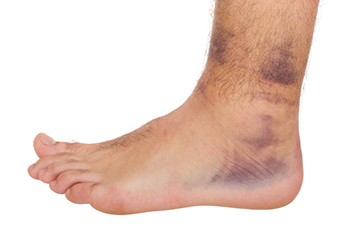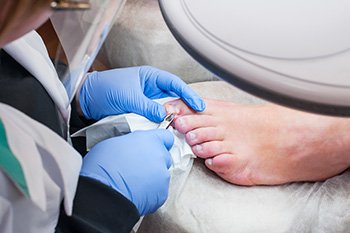Connect With Us
Blog
Items filtered by date: June 2024
Stages of Children's Feet From Pre-Crawling to School

Children's feet go through various stages of development, each requiring specific care and attention. During the pre-crawling stage, infants have soft, pliable feet that need freedom to move and grow, so bare feet or socks are ideal. For newborns, shoes are not necessary, but soft, flexible booties can provide warmth. As babies start taking their first steps, known as the first walker stage, they need lightweight, flexible shoes that allow natural foot movement and provide protection. In preschool, children become more active, necessitating sturdy shoes that offer support and durability. By the time they reach school age, kids' feet have developed arches and require well-fitting shoes that support prolonged periods of walking and running. If you have questions regarding your child’s foot development, it is suggested that you consult a podiatrist who can address any concerns you may have.
Making sure that your children maintain good foot health is very important as they grow. If you have any questions, contact one of our podiatrists of Sutera and Jones Surgical Podiatry. Our doctors can provide the care you need to keep you pain-free and on your feet.
Keeping Children's Feet Healthy
Having healthy feet during childhood can help prevent medical problems later in life, namely in the back and legs. As children grow, their feet require different types of care. Here are some things to consider...
Although babies do not walk yet, it is still very important to take care of their feet.
Avoid putting tight shoes or socks on his or her feet.
Allow the baby to stretch and kick his or her feet to feel comfortable.
As a toddler, kids are now on the move and begin to develop differently. At this age, toddlers are getting a feel for walking, so don’t be alarmed if your toddler is unsteady or ‘walks funny’.
As your child gets older, it is important to teach them how to take care of their feet.
Show them proper hygiene to prevent infections such as fungus.
Be watchful for any pain or injury.
Have all injuries checked by a doctor as soon as possible.
Comfortable, protective shoes should always be worn, especially at play.
If you have any questions please feel free to contact one of our offices located in Media, Glen Mills, Riddle Memorial Hospital, and Concordville, PA . We offer the newest diagnostic and treatment technologies for all your foot and ankle needs.
Causes of Chronic Foot Pain

Chronic foot pain is more than just a nuisance, It can significantly impact your daily life and mobility. Trauma, whether from a sudden injury or repetitive strain, can lead to a variety of foot issues including sprains, strains, and stress fractures. Overuse injuries, common among athletes and those with physically demanding jobs, can result in conditions like Achilles tendonitis and plantar fasciitis. Biomechanical factors, such as improper footwear or structural misalignment, can also contribute to chronic foot pain by causing conditions like bunions, corns, and neuromas. Underlying medical conditions, such as diabetes, gout, and peripheral neuropathy, can result in foot pain and increase the risk of complications. Additionally, infections like athlete's foot or ingrown toenails can cause persistent discomfort if not properly treated. If chronic foot pain is limiting your mobility and interfering with daily activities, it is suggested that you make an appointment with a podiatrist for an exam and treatment.
Foot Pain
Foot pain can be extremely painful and debilitating. If you have a foot pain, consult with one of our podiatrists from Sutera and Jones Surgical Podiatry. Our doctors will assess your condition and provide you with quality foot and ankle treatment.
Causes
Foot pain is a very broad condition that could be caused by one or more ailments. The most common include:
- Bunions
- Hammertoes
- Plantar Fasciitis
- Bone Spurs
- Corns
- Tarsal Tunnel Syndrome
- Ingrown Toenails
- Arthritis (such as Gout, Rheumatoid, and Osteoarthritis)
- Flat Feet
- Injury (from stress fractures, broken toe, foot, ankle, Achilles tendon ruptures, and sprains)
- And more
Diagnosis
To figure out the cause of foot pain, podiatrists utilize several different methods. This can range from simple visual inspections and sensation tests to X-rays and MRI scans. Prior medical history, family medical history, and any recent physical traumatic events will all be taken into consideration for a proper diagnosis.
Treatment
Treatment depends upon the cause of the foot pain. Whether it is resting, staying off the foot, or having surgery; podiatrists have a number of treatment options available for foot pain.
If you have any questions, please feel free to contact one of our offices located in Media, Glen Mills, Riddle Memorial Hospital, and Concordville, PA . We offer the newest diagnostic and treatment technologies for all your foot care needs.
High Ankle Sprains in Athletes

High ankle sprains, prevalent among athletes, are distinct from traditional ankle sprains due to the affected ligaments. These injuries typically occur during sudden twists or impacts that force the foot upwards, straining the ligaments connecting the two lower leg bones, the tibia, and fibula. These are unlike common ankle sprains, which involve the ligaments on the sides of the ankle. The injury causes pain, swelling, and instability, hindering mobility and performance. Sports that involve rapid changes in direction or jumping, such as basketball, soccer, and football, pose a higher risk. Factors like insufficient warm-up, wearing improper footwear, and fatigue exacerbate the likelihood of injury. Timely diagnosis and appropriate treatment, including rest, compression, and elevation, are critical for recovery and prevent long-term complications in athletes. If you have suffered an ankle sprain during a sporting activity, it is suggested that you consult a podiatrist who can determine which type of sprain it is, and treat it accordingly.
Although ankle sprains are common, they aren’t always minor injuries. If you need your ankle injury looked at, contact one of our podiatrists from Sutera and Jones Surgical Podiatry. Our doctors can provide the care you need to keep you pain-free and on your feet.
How Does an Ankle Sprain Occur?
Ankle sprains are the result of a tear in the ligaments within the ankle. These injuries may happen when you make a rapid shifting movement while your foot is planted. A less common way to sprain your ankle is when your ankle rolls inward while your foot turns outward.
What Are the Symptoms?
- Pain at the sight of the tear
- Bruising/Swelling
- Ankle area is tender to touch
- In severe cases, may hear/feel something tear
- Skin discoloration
Preventing a Sprain
- Wearing appropriate shoes for the occasion
- Stretching before exercises and sports
- Knowing your limits
Treatment of a Sprain
In many cases, the RICE method (Rest, Ice, Compression, and Elevate) is used to treat ankle sprains. However, you should see a podiatrist to see which treatment option would work best with your injury. In severe cases, surgery may be required.
It is important to ask your doctor about rehab options after you receive treatment for your injury. Stretching, strength training, and balance exercises may help the ankle heal while also preventing further injury.
If you have any questions, please feel free to contact one of our offices located in Media, Glen Mills, Riddle Memorial Hospital, and Concordville, PA . We offer the newest diagnostic and treatment technologies for all your foot care needs.
Are You Suffering From Ingrown Toenails?
Ingrown Toenails and Why Podiatric Care Matters

An ingrown toenail occurs when the edge of the nail grows into the surrounding skin, leading to pain, swelling, and potential infection. This common condition can arise from improper nail trimming, wearing tight shoes, trauma, or naturally curved nails. While some may attempt self-care remedies, seeking professional assistance from a podiatrist is vital for safe, effective relief and treatment. Podiatrists possess the expertise to accurately diagnose the severity of the ingrown toenail and recommend appropriate interventions. Treatment methods may include gentle nail trimming, lifting the nail edge, or in severe cases, surgical procedures to remove the ingrown portion of the nail. Ignoring an ingrown toenail or attempting amateur treatments can make the problem worse, leading to complications such as infection or chronic pain. It is suggested that you make an appointment with a podiatrist for tailored treatment to alleviate discomfort from an ingrown toenail.
Ingrown toenails can become painful if they are not treated properly. For more information about ingrown toenails, contact one of our podiatrists of Sutera and Jones Surgical Podiatry. Our doctors can provide the care you need to keep you pain-free and on your feet.
Ingrown Toenails
Ingrown toenails occur when a toenail grows sideways into the bed of the nail, causing pain, swelling, and possibly infection.
Causes
- Bacterial infections
- Improper nail cutting such as cutting it too short or not straight across
- Trauma to the toe, such as stubbing, which causes the nail to grow back irregularly
- Ill-fitting shoes that bunch the toes too close together
- Genetic predisposition
Prevention
Because ingrown toenails are not something found outside of shoe-wearing cultures, going barefoot as often as possible will decrease the likeliness of developing ingrown toenails. Wearing proper fitting shoes and using proper cutting techniques will also help decrease your risk of developing ingrown toenails.
Treatment
Ingrown toenails are a very treatable foot condition. In minor cases, soaking the affected area in salt or antibacterial soaps will not only help with the ingrown nail itself, but also help prevent any infections from occurring. In more severe cases, surgery is an option. In either case, speaking to your podiatrist about this condition will help you get a better understanding of specific treatment options that are right for you.
If you have any questions please feel free to contact one of our offices located in Media, Glen Mills, Riddle Memorial Hospital, and Concordville, PA . We offer the newest diagnostic and treatment technologies for all your foot and ankle needs.
Blog Archives
- March 2025
- February 2025
- January 2025
- December 2024
- November 2024
- October 2024
- September 2024
- August 2024
- July 2024
- June 2024
- May 2024
- April 2024
- March 2024
- February 2024
- January 2024
- December 2023
- November 2023
- October 2023
- September 2023
- August 2023
- July 2023
- June 2023
- May 2023
- April 2023
- March 2023
- February 2023
- January 2023
- December 2022
- November 2022
- October 2022
- September 2022
- August 2022
- July 2022
- June 2022
- May 2022
- April 2022
- March 2022
- February 2022
- January 2022
- December 2021
- November 2021
- October 2021
- September 2021
- August 2021
- July 2021
- June 2021
- May 2021
- April 2021
- March 2021
- February 2021
- January 2021
- December 2020
- November 2020
- October 2020
- September 2020
- August 2020
- July 2020
- June 2020
- May 2020
- April 2020
- March 2020
- February 2020
- January 2020
- December 2019
- November 2019
- October 2019
- September 2019
- August 2019
- July 2019
- June 2019
- May 2019
- April 2019
- March 2019
- February 2019
- January 2019
- December 2018
- November 2018
- October 2018
- September 2018
- August 2018
- July 2018
- June 2018
- May 2018
- April 2018
- March 2018
- February 2018
- January 2018
- December 2017
- November 2017
- October 2017
- September 2017
- August 2017
- July 2017
- June 2017
- May 2017
- April 2017
- March 2017
- February 2017
- January 2017
- December 2016
- November 2016
- October 2016
- September 2016
- August 2016
- July 2016
- June 2016
- May 2016
- April 2016
- March 2016
- February 2016
- January 2016
- December 2015
- November 2015
- October 2015
- September 2015
- August 2015
- July 2015
- June 2015
- May 2015
- April 2015
- March 2015
- February 2015
- January 2015
- December 2014
- November 2014
- October 2014
- September 2014

